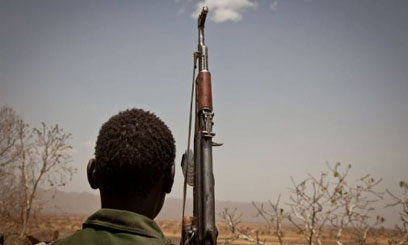
A Sudan People's Liberation Movement (SPLA-N) rebel looks out toward Talodi, in South Kordofan © AFP
KHARTOUM, May 3 – Khartoum on Thursday said it seeks peace with South Sudan and hopes the small country responds favourably to African Union and UN resolutions for ending hostilities.
“The government of Sudan confirms her own strategic calls to have peace between the two states and it hopes the government of South Sudan gives a positive reaction to the African and UN Security Council resolutions,” the foreign ministry’s spokesman, Al-Obeid Meruh, said in a statement.
While recommitting Khartoum to African Union (AU) efforts to end hostilities between Sudan and South Sudan, the foreign ministry’s statement was vague in its response to a United Nations resolution backing the AU plan.
The UN Security Council on Wednesday ordered Sudan and the South to halt hostilities in 48 hours or face possible sanctions, giving diplomatic muscle to AU efforts to end violence and get peace negotiations started.
“The Minister of Foreign Affairs renews the position of the government of Sudan and her commitment to African solutions to African problems and conflicts,” said Meruh.
He said the minister, Ali Karti, also confirmed his readiness to cooperate with the AU mediation process led by Thabo Mbeki, the former South African president.
Sudan withdrew from that process after South Sudan began a 10-day occupation of the north’s main oil field in Heglig last month, a move which coincided with air strikes against the South and raised fears of all-out war.
The African Union itself, in a decision last Tuesday, asked the Security Council to endorse its demand that the two Sudans halt hostilities, start talks within two weeks and complete a peace accord in three months.
With China and Russia joining growing calls for a stop to the border conflict, which began in late March, the 15-member Security Council unanimously passed a resolution backing the AU effort.
Warning of a looming “full scale and sustained war,” US ambassador Susan Rice told the council “both countries are on the brink of returning to the horrors of the past and threaten to take the entire region with them.”
While still one country, north and south Sudan fought a two-decade civil war up to 2005 in which more than two million people died.
Tensions have quickly risen since the South’s independence in July last year with a series of issues unresolved.
South Sudan’s Minister for Cabinet Affairs Deng Alor Kuol offered his country’s “solemn commitment” to follow the resolution.
But he appealed to the United Nations to “urgently mobilise humanitarian assistance for the population affected by Sudan’s continuous aerial bombardments and ground incursions” into the South.
Sudan’s UN ambassador Daffa-Alla Elhag Ali Osman expressed reservations about the resolution, however.
“Peace between the two republics, Sudan and South Sudan, will only be achieved by halting all forms of support and sheltering proxy rebel and armed groups espoused by South Sudan,” Osman told the council.
On Tuesday Sudan’s foreign ministry said it had notified the AU that it agreed to the roadmap, but it also warned the South over widening “aggression”.
The South in turn alleged fresh armed clashes.
Sudan on Saturday expressed concern about an unspecified “hidden agenda” and rejected UN Security Council involvement.
After Khartoum’s military said it had forced the South out of Heglig, Sudanese President Omar al-Bashir vowed there would be no more talks with the South, whose government he earlier described as an “insect” that must be eliminated.
Journalists and freedom of expression are under increasing attack in Sudan, where newspapers have been confiscated and reporters charged with “spurious crimes,” Amnesty International said Thursday.
Sudan’s crackdown dates from early last year when uprisings began against oppressive rulers in North Africa and the Middle East, the London-based watchdog said.
“The pattern of harassment and intimidation of critics of the government has intensified since January 2011,” said Erwin van der Borght, Amnesty International’s Africa director.
“Sudanese authorities have shut down 15 newspapers, confiscated more than 40 newspaper editions, arrested eight journalists and banned two from writing, seriously curtailing freedom of expression,” van der Borght said in a statement coinciding with World Press Freedom Day.









































